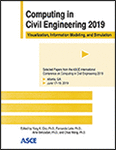ASCE International Conference on Computing in Civil Engineering 2019
A Hybrid Simulation Approach for Understanding the Social Contagion Effect of Safety Violations within the Construction Crew
Publication: Computing in Civil Engineering 2019: Visualization, Information Modeling, and Simulation
ABSTRACT
Previous studies have recognized the social factor of safety violation within the construction crew. However, discussion on the social contagion effect of safety violation is still sparse. Therefore, this research aims to develop a hybrid simulation approach for looking into the cognitive, social, and organizational aspects that can altogether determine the social contagion effect of safety violations within the construction crew. The hybrid approach integrates system dynamics (SD) and agent-based modeling (ABM) to better represent the real world. SD is used to capture the systematic level dynamics such as the influence of perceived production pressure. ABM is employed to mimic the decision rules and interactions among the worker and management. The research contributes to providing a practical framework to examine how specific accident prevention measures (e.g., setting the safety goal) interacting with worker or environmental characteristics (e.g., the hazard level) influence the social contagion effect of safety violations. Our findings show that different interventions should be taken for situational and routine safety violations. Our model can also serve as a test-bed to evaluate different safety programs or strategies by considering the social contagion effect of safety violations.
Get full access to this article
View all available purchase options and get full access to this chapter.
REFERENCES
Ahn, S., Lee, S., and Steel, R. P. (2013). “Effects of workers’ social learning: Focusing on absence behavior.” J. Constr. Eng. Manage., 139(8), 1015-1025.
Choi, B., and Lee, S. (2018). “An Empirically Based Agent-Based Model of the Sociocognitive Process of Construction Workers’ Safety Behavior.” J. Constr. Eng. Manage., 144(2), 04017102.
Debono, D. S., Greenfield, D., Travaglia, J. F., Long, J. C., Black, D., Johnson, J., and Braithwaite, J. (2013). “Nurses’ workarounds in acute healthcare settings: a scoping review.” BMC Health Serv. Res., 13(1), 175.
Fang, D., Wu, C., and Wu, H. (2015). “Impact of the supervisor on worker safety behavior in construction projects.” J. Manage. Eng., 31(6), 04015001.
Jiang, Z., Fang, D., and Zhang, M. (2015). “Understanding the Causation of Construction Workers’ Unsafe Behaviors Based on System Dynamics Modeling.” J. Manage. Eng., 31(6), 04014099.
Jo, H., Lee, H., Suh, Y., Kim, J., and Park, Y. (2015). “A dynamic feasibility analysis of public investment projects: An integrated approach using system dynamics and agent-based modeling.” Int. J. Proj. Manag., 33(8), 1863-1876.
Liang, H., Lin, K.-Y., Zhang, S., and Su, Y. (2018a). “The Impact of Coworkers’ Safety Violations on an Individual Worker: A Social Contagion Effect within the Construction Crew.” Int. J. Environ. Res. Public Health, 15(4), 773.
Liang, H., Lin, K.-Y., and Zhang, S. (2018b). “Understanding the Social Contagion Effect of Safety Violations within a Construction Crew: A Hybrid Approach Using System Dynamics and Agent-Based Modeling.” Int. J. Environ. Res. Public Health, 15(12).
Lingard, H., Cooke, T., and Blismas, N. (2011). “Coworkers’ response to occupational health and safety: An overlooked dimension of group-level safety climate in the construction industry?” Eng. Constr. Archit. Manag., 18(2), 159-175.
Lu, M., Cheung, C. M., Li, H., and Hsu, S.-C. (2016). “Understanding the relationship between safety investment and safety performance of construction projects through agent-based modeling.” Accid. Anal. Prev., 94, 8-17.
Man, S., Chan, A. H., and Wong, H. (2017). “Risk-taking behaviors of Hong Kong construction workers–A thematic study.” Saf. Sci., 98, 25-36.
Wilde, G. J. (1982). “The theory of risk homeostasis: implications for safety and health.” Risk Anal. 2(4), 209-225.
Information & Authors
Information
Published In
Computing in Civil Engineering 2019: Visualization, Information Modeling, and Simulation
Pages: 514 - 521
Editors: Yong K. Cho, Ph.D., Georgia Institute of Technology, Fernanda Leite, Ph.D., University of Texas at Austin, Amir Behzadan, Ph.D., Texas A&M University, and Chao Wang, Ph.D., Louisiana State University
ISBN (Online): 978-0-7844-8242-1
Copyright
© 2019 American Society of Civil Engineers.
History
Published online: Jun 13, 2019
Authors
Metrics & Citations
Metrics
Citations
Download citation
If you have the appropriate software installed, you can download article citation data to the citation manager of your choice. Simply select your manager software from the list below and click Download.
